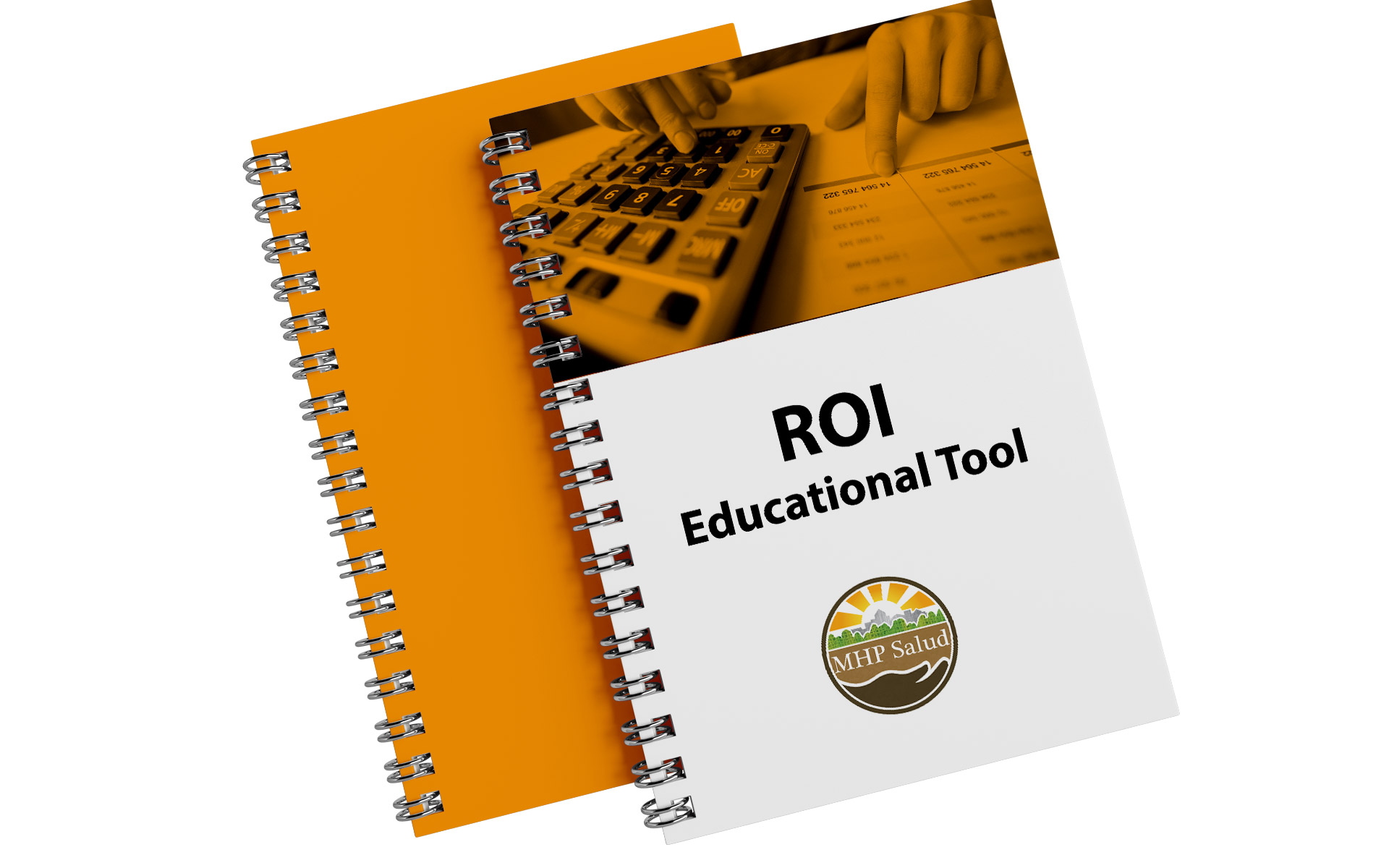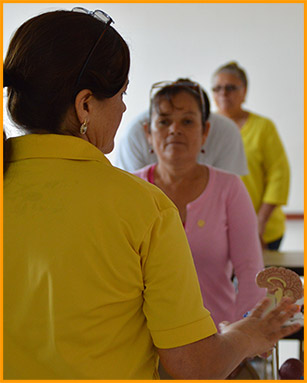

Community Health Workers and Return on Investment (ROI)
Community Health Worker programs all over the world have demonstrated compelling returns on investment. With a track record stemming from 35 years of experience, our own programs are proof that the Community Health Workers help empower underserved communities. The best part? Over time these programs pay for themselves. Everybody wins.

Improving Health Outcomes while Maintaining Costs with CHWs
Community Health Workers (CHWs) act as a bridge between the community and social and healthcare services. The positive impact that Community Health Worker-led programs have on health often have significant economic effects for individuals, healthcare organizations, and society. Economic benefits can occur in multiple ways; through increased productivity, increased tax contributions to society, or through savings in healthcare costs.
The economic benefits of Community Health Worker programs are best measured through return on investment (ROI) analysis, which demonstrates the amount of money saved for every $1 invested in these programs. MHP Salud provides a free ROI toolkit for organizations that want to conduct ROI on their CHW-led programs. MHP Salud also offers ROI training as well as direct This service is appropriate for a wide variety of organizations and can be adapted to meet their unique needs. Some important factors that MHP Salud considers when determining ROI include data quality, budgetary information, and comparison data with which to compare the results of ROI analysis.
The current national attention paid on improving health outcomes and quality of care, while also containing costs, makes positive ROI results even more significant. Measuring ROI of CHW-led programs, and sharing the results, contributes to a growing body of evidence that investments in these programs are both impactful and financially sustainable. ROI results additionally provide a great “snapshot” of information to share with both stakeholders and the community, to demonstrate both social and fiscal responsibility. Evidence suggests that Community Health Worker programs provide ROI, for example, one CHW-led program had a ROI of $1.12 for every $1 spent on a diabetes management program; another CHW-led program had a $2 return for every $1 spent on a multi-chronic disease management program.[1],[2]
Demonstrating positive ROI for chronic conditions has enormous implications for healthcare organizations, as the most common health challenges are often the costliest.[3] MHP Salud’s evaluation team recently conducted ROI analyses for two CHW-led programs: a cancer prevention program, which demonstrated ROI of $3.16 for every $1 spent; and a diabetes management program, which demonstrated ROI of $1.09 for every $1 spent. These outcomes generate a positive ROI, both individually and societally. Other organizations have found similar results, in 2020 a study published Health Affairs revealed that analysis of a randomized control trial of a University of Pennsylvania CHW intervention would return $2.47 to the average medicaid payer within a fiscal year.[4]

We’ve developed free resources intended to help organization measure and understand the economic benefits of Community Health Worker programs. All resources are available after registration to our resource portfolio. Sign up for free!
Cancer Prevention and the ROI of CHW Programs
ROI analysis on Cada Paso del Camino (Every Step of the Way), MHP Salud’s cancer prevention program, revealed that the program was extremely cost-effective, with a return of $3.16 for every $1 spent on the program. This is a sizeable return on investment and has important implications for the implementation of CHW programs to improve access to cancer services.
Cada Paso del Camino was implemented from 2015-2018 in the Rio Grande Valley of Texas. MHP Salud created Cada Paso del Camino to increase cancer screening rates so that breast, cervical and colon cancer diagnoses could be made earlier, thus improving disease outcomes. The program used the Community Health Workers to connect community residents to cancer screening, diagnosis, and treatment services, which were made available at a partner clinic. Community Health Workers conducted outreach, provided one-on-one education, referred participants to services, and later followed-up with participants. Community Health Workers were very successful at increasing the number of cancer screenings for residents of Hidalgo and Starr Counties. In total, 7,986 individuals received outreach education and 2,730 were screened for cancer.
Program participants were positively impacted by the CHW-led program, as it addressed common barriers to receiving preventive cancer services. ROI results demonstrated that there was also significant economic benefit associated with the CHW-led program.


Diabetes Management and the ROI of CHW Programs
MHP Salud found that Salud y Vida (Health and Life), the agency’s diabetes management program, demonstrated positive ROI with a return of $1.09 for every $1 invested in the program. Positive ROI for this program is significant, but not surprising, as it is reflective of ROI results for other CHW programs that target chronic conditions.
Salud y Vida ran from 2014 to 2018 in the Rio Grande Valley of Texas. Community Health Workers led educational classes on diabetes management for participants with uncontrolled diabetes. Community Health Workers were very successful at engaging participants and improving clinical outcomes, most pertinently Hemoglobin A1c, a marker of glycemic/blood sugar control. Participants participated in a Diabetes self-management course led by CHWs and received case management services for up to 12 months. There was a statistically significant decrease in hemoglobin A1C for participants, from baseline to three-month follow-up. At 12 months, about half of participants (48.1%) had reached and maintained moderate to good glycemic control.
Successfully managing diabetes can not only improve quality of life, but it can also prevent costs associated with treating complications that result from poor disease management. Over the course of Salud y Vida, hundreds of participants successfully completed the program. The key to the program’s success is no secret: Community Health Workers are well-suited to connect with program participants because they share a cultural background. This common understanding between CHWs and program participants leads to better health outcomes and stronger program results.

Salud y Vida resulted in positive outcomes
for participants and achieved high ROI.
Application Assitance and ROI
The Colonia Outreach Program provided outreach, information, eligibility pre-screening, and enrollment assistance for public programs to the colonias of Hidalgo and Starr counties, Texas. Colonias are typically rural, and made up of predominantly Hispanic and Latino populations. Texas colonias are home to an estimated 500,000 people. Often, these communities lack necessities such as potable water, safe housing, or electricity. Forty two percent of residents living within Texas colonias are below the poverty line, and another 19 percent are close to it.
The Colonia Outreach Program used Community Health Workers to conduct door-to-door outreach inside the colonias, an invaluable tool in helping residents access healthcare and social services. The program demonstrated significant ROI, with a rate of return of $2.19 for every $1.00 spent.
About MHP Salud
Community Health Workers are continually being confirmed as a means to achieve impactful health outcomes for patients and communities. Positive ROI results from Community Health Worker-led programs contribute to the evidence of their success as an effective means to improve the quality of healthcare services while controlling health spending. MHP Salud offers free resources, as well as training and consulting services to support organizations that want to measure ROI for their CHW-led programs. MHP Salud has over thirty years of experience implementing CHW programs and training organizations looking to start and/or strengthen their own CHW programs. For more information about MHP Salud, our services, and how we can help you, please email us at info@mhpsalud.org
Sources:
[1] London, K., Love, K., & Tikkanen, R. (2017). Sustainable Financing Models for Community Health Worker Services in Connecticut: Translating Science into Practice. Connecticut Health Foundation. Retrieved from https://www.cthealth.org/wp-content/uploads/2017/06/CHF-CHW-Report-June-2017.pdf
[2] Kangovi, S., Mitra, N., Grande, D., Huo, H., Smith, R. A., & Long, J. A. (2017). Community Health Worker Support for Disadvantaged Patients With Multiple Chronic Diseases: A Randomized Clinical Trial. American Journal of Public Health, 107(10), 1660–1667. https://doi.org/10.2105/AJPH.2017.303985
[3] https://www.cdc.gov/chronicdisease/about/costs/index.htm
[4] https://www.healthaffairs.org/doi/full/10.1377/hlthaff.2019.00981


